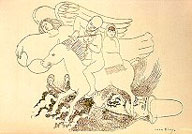
|
|
|
| History of Portuguese Literature | Origins of Portuguese Literature | The Portuguese Language | Oral Literature | Fiction | Lyricism |
| Travel Literature | Cantigas de amigo | Historiography | Doctrinal Prose | ||
Vergílio Ferreira
(1916-1996)
|
|
He established a reputation for himself as a novelist and essay-writer (Espaço do Invisível, 1965, Invocação ao Meu Corpo, 1969), and from the outset his novels were influenced by neo-realism (O Caminho Fica Longe, 1943). Later, they would continue along the path of existentialism prepared by Sartre and Heiddeger (Mudança, 1949, Aparição, 1959).
 Drawing by Mário Eloy [1900-1951] |
Simultaneously
lyrical and violently critical in relation to his own contemporaneousness, he
engaged in a reflection upon time, both in the novel and in existence, which he
then directed towards the enhancement of life (Alegria
Breve, 1965), towards a protest against all political and social acceptances
(Signo Sinal, 1979) or towards the
perception of the connections between the opposite aspects of the human being in
his discourse (death/life, beauty/ugliness, sacred/profane, creation/destruction),
all centred around the notions of his existence and his threshold (Até
ao Fim, 1987, Em Nome da Terra,
1990).
I
am alone - you are alone. Don’t think about it. Don’t speak. You are, in
yourself, only the maximum of yourself. Anything higher than you are has assumed
you and rejected you like the tree that is pruned so that it can grow. What will
it profit you to think of yourself as the branch that has been suppressed? The
tree exists and continues out beyond your suppressed accidentality. What
distinguishes and oppresses you is the thought that the stone does not have to
do anything in order to become realised as a stone. And the stars, and the
animals. Base your greatness on this if you wish, but make sure that you
recognise and accept the greatness that exceeds you.
Para
Sempre
© Instituto Camões, 2001